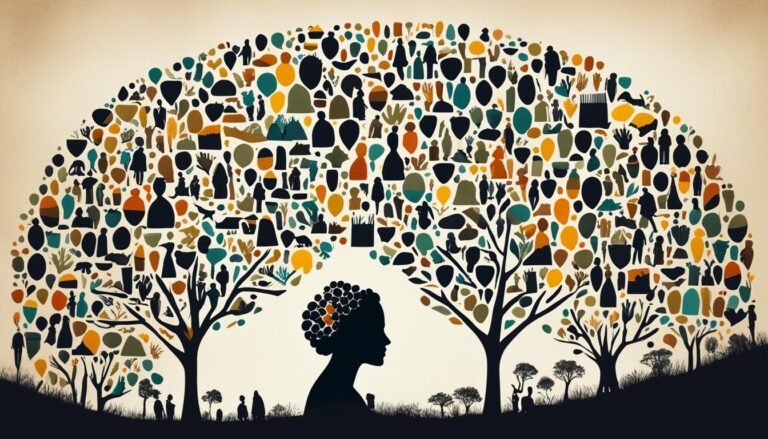What are the Facts About Black Men Depression?
Depression is a prevalent mental disorder that affects millions of people in the United States every year. Amongst various demographics, African American men experience a prevalence of depression ranging from 5% to 10%. Unfortunately, this group faces numerous risk factors, including racial discrimination, work stressors, retirement, socioeconomic positioning, poverty, and the lack of a strong social support network. These factors contribute to the high prevalence of depression in this population. However, it is concerning that there is often low utilization of mental health services among African American men, perpetuating mental health disparities within their community.
Key Takeaways:
- Depression affects a significant number of African American men, with prevalence ranging from 5% to 10%.
- Risk factors such as racial discrimination, work stressors, and socioeconomic factors contribute to the high prevalence of depression in this demographic.
- There is low utilization of mental health services among African American men, highlighting the need for increased awareness and access to these services.
- The societal expectation for African American men to be strong and suppress their emotions may contribute to the underdiagnosis and underreporting of depression symptoms.
- Addressing mental health disparities and providing culturally competent care is crucial in improving the mental wellness of African American men.
Prevalence of Depression Among African American Men
Depression is a prevalent mental health condition among African American men, with studies indicating a prevalence rate ranging from 5% to 10%. However, it is important to acknowledge that depression is often underdiagnosed within this demographic. The societal expectation for African American men to exhibit strength in the face of adversity and to conceal their emotions may contribute to the underreporting of depression symptoms.
This underdiagnosis and lack of treatment further exacerbates the mental health disparities experienced by African American men. Without proper diagnosis and intervention, individuals are at a higher risk of experiencing worsened mental health outcomes and potentially enduring prolonged periods of distress.
Addressing the underdiagnosis and stigma associated with depression in African American men is crucial for improving mental health outcomes in this community. By creating a safe and supportive environment that encourages individuals to seek help, it becomes possible to bridge the mental health gap and provide appropriate treatment and support.
Factors Influencing Depression Prevalence
Various factors contribute to the prevalence of depression among African American men. These can include:
- Racial discrimination
- Work-related stressors
- Retirement
- Socioeconomic positioning
- Poverty
- Lack of social support
These challenges, coupled with the societal pressure on African American men to fulfill traditional notions of masculinity, may discourage them from seeking help or openly discussing their mental health concerns.
“Addressing the underdiagnosis and stigma associated with depression in African American men is crucial for improving mental health outcomes in this community.”
To effectively address the prevalence of depression among African American men, it is essential to develop culturally competent and accessible mental health services. By acknowledging the unique experiences, challenges, and cultural factors that influence mental health in this population, appropriate interventions can be tailored and implemented, leading to improved mental wellness and reduced disparities.
Closing Thoughts
Recognizing and understanding the prevalence of depression among African American men is a significant step toward reducing mental health disparities within this community. By destigmatizing mental health, raising awareness, and providing targeted support, it becomes possible to empower individuals to seek help and improve their overall well-being.
| Depression Prevalence Among African American Men | 5% | 10% |
|---|
Risk Factors and Barriers to Treatment for African American Men with Depression
African American men face several risk factors that contribute to their vulnerability to depression. These factors include:
- Racial discrimination
- Work stressors
- Retirement
- Socioeconomic positioning
- Poverty
- Lack of social support
These risk factors can have a significant impact on African American men’s mental health and increase their susceptibility to depression.
However, seeking treatment for depression can be challenging for African American men due to various barriers. Some of the barriers to treatment include:
- Limited access to mental health services
- Financial constraints
- Stigma associated with mental illness
- Lack of culturally competent care
These barriers can prevent African American men from receiving the mental health support they need, further exacerbating the mental health disparities among this population.
Addressing these risk factors and barriers to treatment is crucial in improving mental health outcomes for African American men. Providing targeted support, increasing access to mental health services, reducing stigma, and ensuring culturally competent care can help overcome these barriers and promote better mental well-being in this population.
| Risk Factors | Barriers to Treatment |
|---|---|
| Racial discrimination | Limited access to mental health services |
| Work stressors | Financial constraints |
| Retirement | Stigma associated with mental illness |
| Socioeconomic positioning | Lack of culturally competent care |
| Poverty | |
| Lack of social support |
Addressing Risk Factors and Barriers to Treatment
“It is essential to implement targeted strategies that specifically address the risk factors and barriers to treatment faced by African American men with depression. By doing so, we can improve mental health outcomes and promote a more equitable and inclusive mental health care system.”
— Dr. Samantha Johnson, Psychologist
Efforts should focus on increasing awareness of mental health issues among African American men, providing education on available resources, and promoting culturally sensitive approaches to mental health care. This may include:
- Developing community outreach programs
- Collaborating with faith-based organizations
- Training mental health professionals in cultural competence
- Encouraging peer support groups
- Advocating for policy changes to improve access to care
By addressing these risk factors and barriers to treatment, society can work towards reducing the disparities in mental health outcomes and ensure that African American men have equal opportunities for mental well-being.

Impact of Structural Racism on Black Men’s Mental Health
Black men face unique challenges that significantly impact their mental health. Structural racism, which encompasses a range of systemic biases and discriminatory practices, plays a central role in exacerbating these challenges. Through various mechanisms, such as residential segregation, labor market discrimination, negative stereotyping, and overcriminalization, structural racism severely limits the economic opportunities available to Black men.
These disparities in socioeconomic status contribute to higher levels of poverty and limited access to resources, which are known risk factors for depression. Additionally, Black men often experience higher levels of violence, compounding the mental health burden they face.
Furthermore, societal norms and ideals about masculinity also contribute to the increased risk of depression among Black men. Men are often socialized to suppress their emotions and be stoic, which can prevent them from seeking help and discussing their mental health concerns openly.
The Impact of Structural Racism on Mental Health: Key Factors
“The stressors and barriers faced by Black men due to structural racism significantly contribute to their vulnerability to depression and other mental health issues.” – Experts in the field
Recognizing the impact of structural racism is crucial in addressing the mental health needs of Black men. By dismantling the systems that perpetuate inequality and discrimination, and challenging harmful masculine ideals, society can create a more supportive environment that fosters mental well-being for Black men.
Addressing Structural Racism for Improved Mental Health Outcomes
Efforts to tackle structural racism and promote mental health among Black men require systemic changes at multiple levels. Policy initiatives that focus on reducing socioeconomic disparities, improving access to quality education, eliminating employment discrimination, and reforming the criminal justice system are essential.
Additionally, creating safe spaces for Black men to openly discuss their mental health concerns and providing culturally competent mental health services can help break down barriers to seeking help.
Engaging community leaders, organizations, and individuals in addressing structural racism and its impact on mental health is critical for achieving lasting change. By promoting equality, fostering social support, and empowering Black men to prioritize their mental well-being, we can work towards building healthier and more resilient communities for everyone.
Conclusion:
Addressing the issue of depression among Black men requires a comprehensive approach that encompasses several key components. Firstly, raising awareness about mental health and depression in the Black community is crucial. By breaking the silence and encouraging open conversations, we can help reduce the stigma associated with seeking help for mental health issues.
In addition to increasing awareness, promoting coping strategies is essential for improving mental wellness in Black men. Engaging in regular exercise can have significant positive effects on mental health, as it helps reduce stress and improve overall well-being. Furthermore, fostering social support networks and encouraging meaningful connections can provide the necessary emotional support and resilience needed to navigate the challenges of depression.
Equally important is empowering Black men to seek help when needed. By providing them with access to culturally competent mental health services, we can ensure that their unique needs and experiences are understood and addressed. Breaking down the barriers to treatment, such as financial constraints and stigma, is crucial in promoting mental wellness in this population.
By addressing the unique challenges faced by Black men and working towards equitable models of care, we can build happier and healthier communities for all. Depression is not something to be faced alone, and seeking help is a sign of strength, not weakness. Together, we can support Black men in their journey towards mental wellness and create a society where no one is left behind.
FAQ
What are the risk factors for depression among Black men?
Black men face several risk factors for depression, including racial discrimination, work stressors, retirement, socioeconomic positioning, poverty, and lack of social support.
Why is depression among Black men often underdiagnosed?
Depression is often underdiagnosed in Black men due to societal expectations for them to be strong in the face of adversity and to hide their emotions.
What are the barriers to treatment for depression among African American men?
Barriers to treatment may include limited access to mental health services, financial constraints, stigma associated with mental illness, and a lack of culturally competent care.
How does structural racism impact the mental health of Black men?
Structural racism, including factors like residential segregation, labor market discrimination, negative stereotyping, and overcriminalization, severely undermines the economic opportunities for Black men and contributes to increased risk of depression.
How can we address depression in Black men?
Addressing depression in Black men requires a comprehensive approach that includes raising awareness, reducing stigma, improving access to mental health services, providing culturally competent care, and promoting coping strategies such as exercise and social support.






